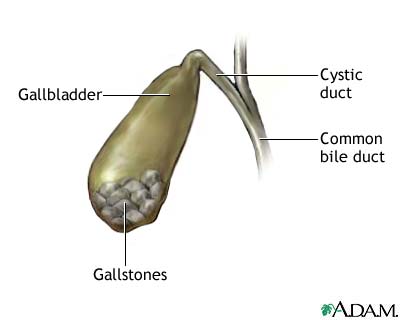
I've had a few people tell me that my mom might have gallstones instead of acid reflux. She's 45 years old and her symptoms are very bad stomach pain, back pain, feeling very hot for a while and then cold, sometimes even vomiting. how do i know what it is? I don't know what to do…we've been to many doctors! PLEASE HELP! I'm very worried about her!
It sounds more like she has a gallbladder problem than reflux. It can sometimes be very hard to determine if it is the gallbladder causing the problem, and since the treatment for it is surgery, doctors like to be certain before they remove it. unfortunately, sometimes that takes a long time, and even then they finally operate just because they have ruled everything else out. You can have a bad gallbladder with or without gall stones. Gall stones are deposits of cholesterol or calcium that harden in your gallbladder creating the pain. other symptoms are a feeling you got slugged right in the center of your abdomen just under the breast, and a feeling of tightness around your body like your bra is too tight. Talk to family & friends to find a doctor that's highly recommended and report all symptoms and all tests other doctors have done. she could try changing her diet to see if it makes a difference so that would be additional information for the new doctor. Avoid all spicy food, fried food, rich foods, mayo, salad dressing. keep the diet lean and simple and see if it makes a difference.
Don't give up. It took me 2 years and a 3 day stay in the hospital before I was diagnosed. good luck.
There are 2 types of gallstones, those composed of cholesterol and those composed of bilirubin and calcium salts that are found in bile. she needs to have an ultrasound done to have a look at her gallbladder. Go to back to one of the drs and tell them to do one. The pain from gallbladder disease sounds about what you described. When I had my one and only attack, it built up like gas and was with me for several hours. and some people have vomiting and nausea. I never had the vomiting, but was nauseous for several days. if it is her gall bladder, it can be removed in a pretty simple outpatient surgery. she might want to cut out foods with a lot of fat in it for awhile too. Hope you find out what is wrong soon.
Its little calcium deposits that build up in the gallbladder and cause a lot of problems. Fortunately you can live fine without your gallbladder so they can remove it if necessary.
Gallstones aren't a life-threatening matter and why you're mother should have to go from one doctor to another is a mystery to me. Hasn't she been diagnosed by now? It's not difficult to distinguish between the two conditions with the right screening.
Your mother may be experiencing symptoms of biliary colic. This occurs when one or more gallstones become lodged in the common bile duct or the cystic duct. I'll need to explain more.
The liver produces bile, a substance the body uses to break down fats for further digestion, similar to the way in which liquid dish detergent breaks up grease on dishes. The liver also secretes bile acid and lecithin into the bile which give it that detergent-like quality. in addition to acids and lecithin, the liver secretes cholesterol into bile as a way of ridding the body of excess cholesterol. The liver Bile is stored in the gallbladder and is released through the cystic and common bile ducts into the small intestine after a meal with fats is eaten. most digestion takes place in the small intestine. The problem happens when the liver secretes more cholesterol than bile acids and lecithin can dissolve. The undissolved cholesterol sticks together and forms solid masses called gallstones. usually these remain in the gallbladder and cause no symptoms and no problems and can go undiagnosed for years. another way gallstones form is when the gallbladder stops emptying itself as quickly as it used to. Bile sits in it longer and gallstones are more likely to form. When gallstones move outside the gallbladder they cause problems. They can get stuck in one or both the ducts and when they do, the painful and problematic condition is called biliary colic.
Acid reflux, or gastroesophageal reflux disease, is an entirely different matter. At the end of the esophagus there is a ring of muscle, the cardiac sphincter. We have sphincters in other parts of the body as well. The job of the cardiac sphincter is to keep stomach contents inside the stomach where they belong. but sometimes the ring of muscle is weak or it spasms and allows stomach contents, along with stomach acid, to back up the esophagus. The word "flux" is Latin for flow. So reflux means reflow. Acid reflux is not normally associated with stomach pain. Instead the burning pain is in the esophagus but can feel like chest pain because the esophagus runs through the midchest.
If your mother has a digestive disorder, a gastroenterologist can easily diagnose her. I suggest she arrange for a consult. if she has HMO insurance, she can request a referral from her primary care doctor.
The only thing that puzzles me is why she's "been to many doctors". Choleycystitis isn't a mystery disease. is there something you've failed to mention???